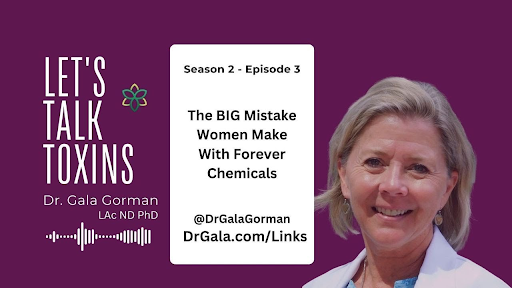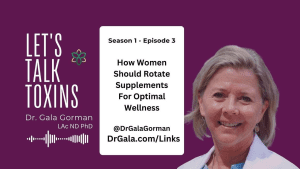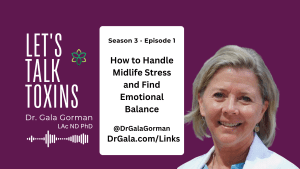NOTE: A machine generated this transcript. Please be aware that it may contain occasional errors in punctuation and spelling.
Women may reach menopause about two years earlier than those with lower exposure. It can interfere with hormone production, particularly affecting FSH, that follicle stimulating hormone.
This is one of the things that we typically monitor with women going through the transition and these FSH levels are really integrally involved in ovarian function.
Welcome to the Let’s Talk Toxin show. Let’s talk today about something that affects all of us, but often goes unnoticed. Endocrine disruptors and their impact on menopause, the sneaky forever chemicals are like uninvited guests at a hormonal party causing chaos and confusion in our bodies. If you’re concerned about chemical exposure and its effects on your hormonal health, you’re not alone…
In this episode, I’m sharing practical strategies for avoiding these endocrine disruptors and detoxing forever chemicals to support your body during menopause and make sure you stay till the end where I answer questions from women, just like you.
If you’re new here, I’m Dr. Gala Gorman, a licensed acupuncturist, naturopath and author of “What’s Your Kryptonite?”. I wrote the book to help women understand the effects of chronic stress that’s turned toxic. In the book I share the MOLT Method™ I developed, to make it easy to shed stress along with the accumulated toxicity. Just like any other creature in nature, that’s outgrown its trappings. Many women find their way to me after trying everything, to deal with their annoying symptoms.
You may feel like you’ve learned more than you ever wanted to know about health and still aren’t healthy. It’s time for a different approach. Symptoms are directly related to stress, but stress isn’t easy to master and it isn’t going away. If you’re ready for a new approach that will lead to stress mastery.
I highly recommend my MOLT membership. It’s perfect for those who have a strong sense, they’re missing something important that’s the key to optimal wellness. In the membership we apply the MOLT Method™ I developed.
MOLT is an acronym. M is for mindset, O is for order, L is for lifestyle and T is for toxins. It’s designed to help you shed stress, cruise through midlife, symptom-free and end issues like chronic fatigue, insomnia, and weight gain. So join us and turn your knowledge into real change.
In this next segment, I share information from research studies related to toxicity. You can think of it as a toxin trend. So, as I mentioned, the T in MOLT stands for toxins, and I can say with confidence that every symptom is caused by accumulated toxicity. I evaluate 12 categories of toxicity when I’m working with someone to unravel a health mystery. Our world is full of man-made substances that our bodies were not designed to deal with. Coupled this toxicity with an overwhelming amount of toxic stressors, the body was designed to manage.
And it’s no wonder women find themselves playing whack-a-mole with symptoms. So here’s a report that’s a great example of a toxin trend. You may recall that I talked a bit in the past about glyphosate related to gluten intolerance. I’ll share the story again in the next segment, but it’s important to know that the damage from its use is accumulating.
Glyphosate is the world’s most widely used herbicide found in common weed killers like Roundup it’s been used in agriculture and home gardens since 1974 to control weeds and unwanted plant growth. But recent research reveals several concerning health impacts from glyphosate exposure, particularly regarding brain health and longterm exposure effects.
So this new research from 2024 shows glyphosate accumulates in brain tissue. Causing persistent inflammation and leading to things like all Alzheimer’s like symptoms, even at low doses. So exposure significantly impairs cognitive functions, including memory learning and social perception with affects persisting even hours after exposure ends.
In fact, I was working with a patient and she was having really odd episodes… not regularly, but more than once… several times episodes after she was playing golf. And It actually sent her to the ER, because she was so concerned with essentially passing out and having heart palpitations. And it turned out that when she played golf on the day that they had just recently sprayed the golf course. The excess exposure was really affecting her.
Now she happened to have issues with her lungs, she was already suffering from kind of a chronic cough and from mold exposure. And so, as you can see, it doesn’t affect everybody the same. It depends on a lot of factors coming together, but glyphosate exposure is really an important thing to avoid wherever possible.
Studies reveal glyphosate exposure causes liver inflammation, metabolic disorders, and DNA damage, particularly affecting early adulthood. So could this possibly be one of the reasons why we’re seeing obesity so regularly with our kids?
Glyphosate exposure occurs primarily through diet and agricultural dust with detectable levels found in most human urine samples. Chronic low dose exposure poses significant risks, particularly during early development stages with effects persisting in the environment. And so if you think you’re avoiding glyphosate exposure just by eating gluten free or organic, then stick around because I will share a story in the next segment that you’ll definitely want to hear.
But just know that latest research indicates that glyphosate causes oxidative stress, hormone disruption, we’ve spoken about that here and increased risk of neurodegenerative diseases. Especially, in rural communities, because these tend to be where most of the farming happens and where there is a concentrated amount of this glyphosate, chemical used in the area.
Chapter 12 in my book “ What’s Your Kryptonite?” is dedicated to helping readers manage what I refer to as Tricky Toxins. Our bodies are bombarded with toxicity, so we have to learn to manage it. Just comment, ”Tricky Toxins”, and we’ll send you a link where you can download the chapter for free. If commenting isn’t convenient, go to DrGala.com/Links and sign up for my Wellness Weekly Newsletter. You can respond to any email you received from me with Tricky Toxins, and we’ll send you a link.
So here’s the next segment that I promised you. And in this segment, I’m opening the kimono to share how I was challenged to apply my suggestions. I’m walking my talk and here’s an example.
Every suggestion you’ll hear from me has been tested in the trenches. That includes saying no to symptom suppression. Over the past four decades, I’ve developed processes that work sustainably. Typically, it requires a combination of approaches that I’ve sent the size to address the health issues that show up repeatedly for many women. I had an opportunity toWalk My Talk where this glyphosate issue is concerned.
Last year, not 20 24, 20 23. When I walked the Camino de Santiago and Northern Spain, and I walked through miles and miles of wheat fields, they were just beautiful. And, you know, I kind of felt like a stranger in a strange land because in the United States, I can’t think of a place where we would literally just walk miles through wheat fields.
But what I did notice, as I looked around at the people that I came into contact with, particularly people from Europe is that… there were way fewer people who were overweight in Europe. And I found this really odd if you recall, just a few minutes ago, when I was talking to you about these metabolic disorders and hormone disruption that these chemicals cause metabolic disruption really leads to weight gain that’s nearly impossible to control.
You really can’t control it with diet alone you’ve got to detox the disruption essentially, that’s going on in your body. In this particular case, it was interesting because out in the countryside, Looking for breakfast, something to eat in the morning to kind of get me going, knowing I was going to walk, you know, probably 12, 15, even 18 miles that day. I would regularly eat a croissant with a banana, which I would never do in the United States, like just way too many carbs for breakfast typically. And I really avoid eating gluten and bananas don’t tend to agree with me, but in this particular case, I felt like I really needed the extra minerals and even the carbs and the essentially simple kind of carbs that my body could access easily.
So it was fascinating because these croissants, especially the ones that were made locally and you can tell, you know, they were very fresh tasting and fluffy and, you know, the only place you find croissants like this tends to be in Europe. But I ate croissants, like my weight and croissants, essentially across Spain. And so it’s fascinating because what I learned is that wheat isn’t necessarily the problem.
The problem actually is the chemical toxicity, so it isn’t necessarily gluten intolerance. Now, if you have been tested for gluten intolerance and you found that you truly are gluten intolerant, then avoid gluten a hundred percent. I don’t have a problem necessarily with that, but I think many of us are trying to eat a gluten-free diet.
And what we’re missing is that it’s really the chemicals that are the problem. And before you think that eating organic is going to completely solve the problem. In doing my research around this issue, I found that in some cases, these grains that had been grown organic are sprayed with these… essentially preservative type chemicals, like glyphosate to get the product through the food chain. So it might’ve been grown with the greatest of intentions, but it’s still not going to be healthy for you.
So you really need to make sure that you are sourcing high quality ingredients, certainly organic, but you also want to know if that product is being managed all the way through the food chain. So, what I found here is that if I’m going to load up on carbs, it’s best to do that in the morning, especially maybe we have just worked out, worked out in a fasted state is the best way to work out.
And this particular case, I couldn’t always control when I was going to be able to stop and find food. So I did eat before I got started, but I was doing a disproportionate amount of movement during this month plus period that I was walking an extended length of time regularly every day, day after day.
If you’ll eat carbs in the morning, particularly during this 9:00 to 11:00 AM period of time. This is the time during your circadian rhythms, when your spleen and pancreas are best equipped to do the blood sugar regulation. That’s going to be required for an additional carb load to be managed. What are the things that I turn to regularly is gluten-free oats and I don’t make them with dairy.
One of the things I love to do is to turn them into a little oats bake and I can make a few days of them in advance and then just put them in my little oven that I reheat them. So this is a great way to sort of prepare in advance. And if you make it in advance and cool it, and then reheat it. You’ve now turned this oats, the starchy oats into a resistant starch by cooling it and then reheating it.
So that’s a lot to process there I know, but just know that I am… test in this stuff out in the trenches. And when I share something with you, I really have experienced it for myself and I have, done the research and I encourage you to maybe try some of the things that have worked for me. And if they don’t work for you, then what that tells me is that you’ve got some other cocktail of toxicity going on that’s going to require a different approach.
So let’s talk about a hidden health concern that affects every one of us forever chemicals just like what I was just talking to you about and how they’re silently impacting our hormonal health during midlife. Understanding how these chemicals interact with our changing bodies during perimenopause and menopause is crucial because the research shows they can accelerate hormonal shifts and potentially trigger early menopause.
While we can’t completely eliminate these chemicals from our environment. The good news is that we can take practical steps to reduce our exposure and protect our hormonal health. So let’s explore what recent research tells us about managing our exposure to these chemicals and supporting our body’s natural detoxification processes.
So let’s start by talking about what forever chemicals are. So they’re known as PFAS, Per- and Polyfluoroalkyl Substances. And there were a group of over 10,000 manmade chemicals developed in the 1940s to make products resistant to water, oil, heat, and staining. These chemicals earn their name forever because they don’t break down in the environment or our bodies. And this leads to accumulation in air, water, soil, food, and any living organisms think humans. Here are some other findings, PFAS are found in everyday items like food wrappers, nonstick cookware, raincoats, and cosmetics.
These chemicals can cause health issues, including cancer, liver damage and decreased fertility. They’ve been found in the blood and breast milk of people and wildlife worldwide. This raises serious concerns about their longterm impact on our health and the environment. So forever chemicals, primarily bind to proteins and accumulate in vital organs rather than fatty tissues.
So sometimes you’ll hear me talk about how, when we lean into fasting or some other method to trigger our body to burn fat for fuel, how we’ll mobilize the fatty tissue. And there will have been toxins stored in that fat. So you get kind of like a toxic load that gets released into your body.
You want to be really prepared to be able to move that out quickly. But in this particular case with the forever chemicals, they are not necessarily stored in fatty tissue. And so they’re stored in other places like your organs, which honestly makes it even more of an issue. Your body can kind of store the fatty tissue and not worry about it, it’s just they’re like in the body’s mind for a rainy day. But these forever chemicals are actually mobilized on a regular basis. These forever chemicals, mainly concentrate in the liver, the blood and the kidneys. And again, if you think about it, the liver, blood and kidneys this is how our body is trying to detoxify.
Any foreign substance essentially and so, if the body doesn’t know what to do with it, then it’s getting into the liver and the kidneys and getting kind of stuck there. So a significant presence was also detected in the lungs and spleen. And so if you’re breathing in these chemicals, they’re coming in through your lungs and then your spleen is just another one of those organs that’s part of your digestive system.
So if we’re consuming food that is laced with these chemicals, then it makes sense that the spleen would be affected by them. These chemicals can be found in breast milk, umbilical cord, blood, and amniotic fluid, showing that they pass through different body systems. And really they are once ingested really inherently part of the system, the. The whole system of the body.
These chemicals damage the protective blood brain barrier, which now then allows more toxins to enter the brain tissue over time.
So it kind of makes sense that as these chemicals are accumulating, we have more and more cognitive decline in humans, and so really this is an issue that as critical to address. These chemicals disrupt brain development by affecting genes that control hormone function and consequently, the brain development. There’s a recent study related to forever chemicals that have been found in the brain.
And it reveals that these PFAS can cross the blood-brain barrier and accumulate in brain tissue. It’s thought that that’s happening at lower concentrations compared to the blood and the liver, most likely because there is this blood brain barrier that they have to find their way across, but they really do damage this protective barrier over time. And as I mentioned, this research corroborates that these chemicals disrupt brain development and lead to neurotoxic effects.
So it’s interesting because we now know that our brain uses a process called neuroplasticity to be regularly repairing itself. And so it was thought years ago that once the brain was damaged, it was not able to be repaired, but that’s not true. It’s constantly repairing itself. But if you can imagine if these chemicals disrupt brain development, that they probably are also disrupting the brain’s ability to repair itself.
Older individuals show a higher concentration in there cerebral spinal fluid and so the CSF is essentially the fluid that floats the brain. And so it makes sense that older individuals would have a higher concentration because they’ve been consuming it or around it for longer. Recent studies also have shown that these forever chemicals have a concerning link to kidney cancer, especially for women. Women tend to be more at risk because I believe… women are more delicately structured hormonally and so hormonal interruption, disruption affects us to a greater degree. The risk increases with higher exposure levels from contaminated drinking water. But I will tell you that the levels that they test for to tell you that your drinking water is safe would not be considered safe for me.
I use filtered water, reverse osmosis, three stage water for just about everything. Do I go overboard? No, I still brush my teeth with water from the sink, but if I’m going to cook with it, or drink it then I want that water to be filtered.
And this study scientists have considered this one of the most well-established cancer risks from PFAS. These endocrine disrupting chemicals can simultaneously affect multiple hormonal systems, including thyroid reproductive and stress hormones.
They’ve been linked to reproductive problems and cancer, metabolic disorders and developmental issues that these are all things I’ve mentioned already, but it’s just important to reiterate that this is not a light problem.
These forever chemicals are accumulating in your body and have been linked to a lot of different issues. So you may not be experiencing all of these, your body may be particularly susceptible in one way, and that’s how they’re disrupting your body in particular. They may cause irregular periods and hormone-related problems during midlife.
There’s a reason why this happens and we’ll talk about that in just a minute, but just know that they also increase the risk of heart disease and bone loss, osteoporosis. So it’s really just at the root potentially of many health issues that mature women face. So remember you can get the Tricky Toxins chapter of my book “What’s Your Kryptonite?” for free, just comment, “Tricky Toxins” and we’ll send you a link where you can download the chapter. If commenting isn’t convenient, go to DrGala.com/Links and sign up for my Wellness Weekly Newsletter. You can respond to any email you received from me with Tricky Toxins and we’ll send you a link.
Now let’s continue with a few practical ways to protect ourselves from these forever chemicals in our daily lives. These chemicals affect more than just our hormones that can actually accelerate aging and increase our risk of various health issues ,during menopause. But here’s the good news, even small changes in our daily routines can significantly reduce our exposure and support our body’s natural detoxification processes.
And don’t forget when I’m done drop a comment to share which exposure reduction tips you’re planning to try and why you think they’ll work best for your lifestyle or potentially the symptom that is showing up for you. So, as I promised, I want to share with you how these forever chemicals influenced your experience during menopause.
Studies have found that exposure to forever chemicals, these PFAS. And other endocrine disrupting chemicals can cause women to experience menopause prematurely. So some of these findings show that women may reach menopause about two years earlier than those with lower exposure, it can interfere with hormone production, particularly affecting FSH, that follicle stimulating hormone.
This is one of the things that we typically monitor with women going through the transition and these FSH levels are really integrally involved in ovarian function. This increases the risk of cardiovascular disease and osteoporosis, as I mentioned, and other health problems. And I’m sure some of them we haven’t even identified yet that can be tied back to these forever chemicals.
It contributes to significant implications for cardiovascular health, bone density, and, and then overall quality of life because your bone health is really going to affect your mobility, and mobility is everything as we age. Cognitive function, which we’ve talked about that and how these forever chemicals can potentially affect your cognitive function and your mobility.
Those two things are just absolutely critical and we need to do everything we can to make sure that we’re taking care of ourselves to preserve those functions so that we can enjoy our advanced years, eighties, nineties, even to a hundred and beyond. Women can take several practical steps to reduce their exposure to PFAS.
And, you know, that’s whether they’re Per or Polyfluoroalkyl Substances. And so one of the things you may have heard about this already. So you want to choose high quality cookware, but even some of the high quality cookware may be lined with a nonstick coating so best to use stainless steel or cast iron.
Alternatives like these that are essentially real metals, don’t tend to leach harmful chemicals into the food. If you are using nonstick cookware, I admit it’s really hard to cook without some sort of nonstick surface. Just ensure that it’s not scratched and avoid heating it above 400 degrees Fahrenheit to minimize the chemical release.
I will say that if you’re going to cook with it, it’s nearly impossible to ensure that you’re not exceeding 400 Fahrenheit. So it’s really just best to learn, to cook with stainless steel. And once you kind of get the hang of it and you know how to get the gunk out of it after you’re done cooking, then you’ll find that they really work best.
So, where food packaging is concerned for those of us who eat a lot of packaged food, even healthy, packaged food, just know that a lot of these packaging options have some sort of PFAS treated lining.
And so you really want to minimize the consumption of fast food and take out. If you’re going to eat out, eat at the restaurant and make sure that the packaging is healthy, many of them healthier, fast food chains now we’ll use like essentially like a paper bowl that is bio-degradable and that would be a preferable alternative.
Also make sure that you are testing your drinking water for PFAS contamination. As I mentioned, I use a high quality water filter, I have that water filter regularly changed I’m on a service. So they send them to me regularly so I can’t forget and really just ensuring that you’re drinking high quality water, but enough water.
I was in a foreign country, recently and spent several weeks there and I found that I just naturally drink less water. It wasn’t easy to come by bottled water and so by the time I got back, when I Scanned myself and was ready to put myself on a new protocol, which I always do after traveling, because we get exposed to a lot of things when traveling that our bodies just have a difficult time managing.
I found that the number one thing I was dealing with was hydration issues. And so I really have been conscious of increasing my consumption. And one of the things we talk about in the Human Energy System Reboot is drinking a hundred ounces of high quality water a day. And that really helps our bodies to flush out these chemicals so that they’re not accumulating.
And if you recall, I said that it was the liver and particularly the kidneys that are most susceptible to having these chemicals build up. So really important to increase the water that you’re drinking during the day, and to make sure that water is high quality water.
Another thing that you just want to really be careful about is the dust that accumulates in your home. And so you want to make sure that you’re regularly vacuuming and dusting your home to reduce the accumulation of these chemicals. And just even household does, especially if you live near a golf course where they spray regularly or you’re in some rural area where they’re spraying regularly. You can open windows for ventilation and that can help to sort of decrease the indoor air pollution, but that might also increase the dust levels.
So it’s just really important to preserve that environment where you’re spending most of your time and make sure that it’s as healthy as possible. And lastly for us women check cosmetic and personal care products for any chemical light content because these things are often used to essentially make the products work better and be easier to use, but they’re not doing you any favors. You can use resources like the environmental working group’s database to identify some safer options. Personally, I use primarily pure cosmetics and at least I can feel pretty good that they’ve done as good a job as is possible to eliminate the really harmful chemicals in things that I’m putting on my skin.
And remember your skin is your largest organ. And so your skin is that first barrier. And you want to make sure that you are not adding anything to your skin. That’s going to increase its toxic load.
Currently there’s no proven method to quickly remove PFAS from the human body, but recent research has identified several promising approaches for reducing exposure. And supporting natural detoxification processes so first we want to use activated carbon filtration.
So if you buy a high quality air filter for your home, make sure that it’s using carbon filtration. Ion exchange resins can also be helpful and then it’s recommended to use high pressure membrane systems, and this just helps to really lock in these toxic chemicals so that they can be trapped by the filters.
Some of the things that we do to just prevent our exposure to these chemicals in our personal life are using PFAS free cookware and containers. We talked about this a few moments ago. Using filtered, drinking water extremely important for many reasons, not just PFAS and you don’t want to be consuming high quality water out of a plastic container that’s not PFAS free.
So you want to watch for that as well, and then it’s not gonna hurt you one bit to reduce the amount of takeout food that you’re consuming. So, regular blood donation can also be really helpful because basically this forces our body to sort of turn over the blood and to produce new blood.
And as we move blood out of our body, the PFAS that has been bound to these red blood cells is taken out with it. So if you feel like this is one of the issues for you, you might make sure that you are donating blood maybe once a month for a period of time, until you start feeling better. You can increase your dietary fiber and this will help to do a better job of excreting these chemicals through your stool because that fiber will really improve your digestion and make the whole process work better.
Another thing you can try is curcumin, the curcumin will decrease the DNA damage that’s been caused by these chemicals. And you can even try vitamin C, increasing your vitamin C supplementation because that may help with insulin resistance that may have been caused by this hormone disruption. That’s often related to accumulating toxicity exposure. The most effective approach though remains exposure reduction since there’s no currently way to clear PFAS from the body rapidly and anything you might do to try to rapidly remove it from the body, for example, culation therapy could create more problems for you.
And so you want to try to reduce your exposure and pull the chemicals out gradually if they’re not causing some life-threatening situation for you. Any detoxification efforts should be undertaken with medical supervision because improper methods could potentially redistribute toxins in the body. And this is really going to create more of a problem for you and potentially store the toxins in a place that’s even harder to pull them out of.
And the next segment, the answers I give to questions I receive quite often apply to and would be helpful for most women. I’ve accumulated a few related questions and I’ll answer them in this segment. Ask away. If you’d like to ask a question, I created a form so that it’s sure to get answered. And your question could be shared in a future episode, helping many other women.
So comment “QUESTION,” and we’ll get you a link to the form. If commenting isn’t convenient, go to DrGala.com/Links and sign up for my Wellness Weekly Newsletter. You can respond to any email you received from me with “QUESTION” and we’ll send you a link.
Can these chemicals make my hormonal symptoms worse during menopause?
So I will say that anything that is causing stress in your body will make your symptoms worse during perimenopause and even into menopause. Our bodies need some additional resources to work with as we go through the transition and stress often has our adrenals already kind of overloaded.
And so when our body is turning to this transition then if the adrenal glands are already on overload, they don’t have anything to donate. And this basically then leaves stress to accumulate and leaves our body with nothing to help manage this hormonal imbalance. So, remember the hormonal imbalance includes FSH, which is Follicle Stimulating Hormone and estradiol. And it really speeds up the ovarian aging process and remember If you didn’t watch the whole episode, I encourage you to watch the whole episode where I talked about these forever chemicals, but it’s important to remember that research has shown that menopause can be started up to two years early.
As a result of this chemical toxicity, and so that’s going to be hard on the body. The body was not designed to deal with these major hormone fluctuations at a time that it’s not otherwise prepared for it. So, again, these forever chemicals interfere with normal hormone production during the transition, but honestly, during any time of life and they have been tied to metabolic dysfunction and many other dis-ease conditions that ultimately leads to disease.
Why are post-menopausal women more vulnerable to PFAS accumulations?
So these forever chemicals like PFAS really disrupt our hormones. And so even if you’re not in menopause, they’re still affecting your cycle, if you will. And so the other thing to keep in mind again, if you listen to the whole episode, You’ll hear me talk about the importance of triggering your body to produce fresh blood. And that happens for women during their menstrual cycle typically every month.
And so when we’re not cycling, we’re not producing fresh blood. And so what I recommended was that you donate blood regularly to force your body, to generate fresh blood. The longer you’ve been exposed to these forever chemicals, the more they affect you, and so it just makes sense that women who have reached peri-menopause would have more of a problem because they’ve had more years for their exposure to accumulate.
There’s also an increased risk of hormone-related complications. You can think of this like cancer and those types of things even thyroid dysfunction. These, hormone-related processes in the body really contribute to dis-ease and escalate to disease.
Is there a connection between forever chemicals and hormone-related cancers? So research has found that these forever chemicals may double the risk of melanoma in women. So skin cancer is obviously a big problem and so it’s really important to be careful about the chemicals that you put on your body.
Women tend to use a lot more things like lotions and creams on their skin. And your skin is your first layer of defense, your largest organ in your body. And so if you are using chemical laden things on your skin. It makes sense that this would increase your risk of developing skin cancer melanoma. The risk is also increased for endometrial cancer. And I would imagine that this is especially true for women who started seeing signs of hormone-related issues earlier.
So, those women whose struggle with PCOS would want to be extremely cautious about using chemicals that would be potentially increasing their risk of endometriosis that could eventually escalate. And then, they’re definitely linked to breast cancer, because they are interfering with these hormone receptor positive sites.
And so our normal hormone function again, it’s a really delicate process in the female body and our bodies are designed to manage it perfectly. But when these chemicals get in the way, then it’s not surprising that something like cancer. Which is opportunistic for a weakened system would find a way to take hold and begin to get some momentum.
So again, just really important that you’re monitoring your body and not suppressing symptoms because the symptoms are your signs that the body has accumulated toxicity, whatever type of toxicity that might be. Your body has accumulated toxicity to the point where it’s no longer able to manage it easily.
Can forever chemicals affect my thyroid function and metabolism? Well, It’s been absolutely proven to contribute to metabolic disorders. And people tend to look at the thyroid. Where that’s concerned, but it isn’t just the thyroid it’s also the pancreas and spleen. And so, if you’re finding that you have issues with your thyroid hormone levels before turning to medication, which typically ends up creating more problems in the long run and doesn’t end up solving the problem because… you really haven’t addressed the root cause of the problem, which is some sort of toxicity disrupting the hormonal function in your body.
So yes, these forever chemicals can cause abnormal growth of thyroid cells and definitely, create a more likely situation for metabolic disorders to get some momentum and interfere with metabolic processes. And this potentially leads to weight changes, in a direction we’re not happy with.
And then we turn to drastic measures to try to control the weight and really, we needed to address this toxicity and the root cause of the problem because, weight gain in particular is such a difficult thing to manage and it’s very rarely, completely isolated to over-consumption of calories.
Most people that find themselves really overweight have been trying to diet for a very long time and their weight, you know, they may get some weight off, but then they gain it back and then some, and that’s because they’ve got some sort of toxicity that’s really affecting. not just their metabolic function, but also their brain, their brain chemical structure that really is driving a lot of unwanted behavior.
Are there specific symptoms I should watch for?
And in this particular case, we’re talking about, the signs of forever chemical toxicity. So one of the signs would be sudden or unexplained weight changes. And you know, when you think of sudden or unexplained, I want to say something along the lines of six months or a year.
If you feel like your weight just kind of rocked along and you didn’t have a problem. And then within a year, you kind of your weight ballooned out of control. If there hasn’t been any other explanation and those explanations would include, for example, like a mom having a baby and your hormones just go completely out of control during that period of time or, maybe you’ve had some really stressful event.
Stress really contributes to your body’s inability to be able to manage the digestive function. Digestion is really dependent on the vagus nerve and our ability to be able to get into rest and repair mode. And so if your nervous system has really been on overdrive for an extended period, you might’ve gotten away with it initially.
Especially before you have experienced some of the signs of perimenopause or menopause. But as you get closer to that midlife point, Just know that you’re not going to be able to get away with the stress that you got away with before. And then, you know, you may even be experiencing the early onset of menopause symptoms, maybe even kind of an odd, situation where they come and go.
Just showing that your hormones are really wildly fluctuating, and you’re gonna feel that in your body in more ways than just having a cycle. So these thyroid related issues can include changes in energy, weight, or even mood. And that’s what I find a lot with people who have had weight changes again in a direction they’re not happy with.
That their mood is definitely a factor in how that’s working and there are many warning signs like these that if you’re really just finding some situation to persist, even though you feel like you’re doing all the right things, then you definitely want to look into some of the, this, toxicity, these forever chemicals that we’ve talked about here.
And remember if you’d like me to answer your specific question, make sure to comment “QUESTION,” and we’ll send you a link to the submission form. You want to subscribe to the channel notifications to get regular updates.
And that’s a wrap for this episode. This has been the Let’s Talk Toxin show. Make sure you subscribe to my YouTube channel and activate the notifications. You’ll get a reminder when I’m going live next until then. Be well.













